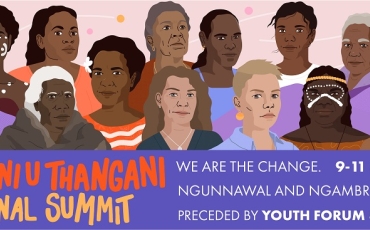Native Title Report 2004: Index
Archived
You are in an archived section of the website. This information may not be current.
This page was first created in December, 2012
Native Title Report 2004
Aboriginal and Torres Strait Islander Social Justice Commissioner
NGUPAWARLU (2003)
Ngupawarlu depicts tali (sandhill) country.
Contents
- Community Guide
- Preface
- Transmittal Letter
- Introduction
- Chapter 1 : The Consultations
- Chapter 2 : Principles for Economic and Social Development
- 1. Respond to the group's goals for economic and social development
- 2. Provide for the development of the group's capacity to set, implement and achieve their development goals
- 3. Utilise to the fullest extent possible the existing assets and capacities of the group
- 4. Agreements should build relationships between stakeholders
- 5. Agreements should integrate activities at various levels to achieve the development goals of the group
- Endnotes
- Chapter 3 : Looking Forward - A Policy Approach to Native Title
- Annexure 1 : Promoting Economic and Social Development through Native Title
- Annexure 2 : Promoting Economic and Social Development through Native Title
- Media Pack
PDF Downloads 
- Community Guide
- Acknowledgements, Preface, Contents, Transmittal Letter
- Introduction
- Chapter 1 : The Consultations
- Chapter 2 : Principles for Economic and Social Development
- Chapter 3 : Looking Forward - A Policy Approach to Native Title
- Annexure 1 : Promoting Economic and Social Development through Native Title
- Annexure 2 : Promoting Economic and Social Development through Native Title
Preface
During 2004, the Federal Government announced substantial changes to the way that it delivers services to Indigenous communities and how it engages with Indigenous peoples. The new changes included the abolition of the Aboriginal and Torres Strait Islander Commission (ATSIC) and Aboriginal and Torres Strait Islander Services (ATSIS) and the transfer of all Indigenous specific programs to mainstream government departments. The Federal Government also announced that all government departments would be required to implement a 'whole of government' approach to service delivery in Indigenous communities, focusing specifically on regional service delivery. Shared responsibility agreements (SRAs) are the mechanism for implementing this approach.
The overall changes being implemented by the Federal Government have become known as the 'new arrangements for the administration of Indigenous affairs'. The new arrangements are discussed in detail in the Social Justice Report 2004 and are considered in the context of native title agreement making and policies in this Report.
What has emerged as a result of the Commonwealth's new arrangements are two structures for agreement making within Indigenous communities - native title agreement making and SRAs.
The latter are based on the Council of Australian Governments (COAG) trials which emphasise improved service delivery; whole of government strategies; partnerships; flexibility; community governance and capacity building. These trials also aim to invest in community leadership; improve government service delivery and promote economic independence for Indigenous communities.
Native title agreements focus on resolving legal issues; managing land use; and addressing compensation. But there is increasing recognition that native title agreements need to be more flexible to ensure practical and sustainable outcomes for all stakeholders.
As a result of this recognised need for flexibility, there is an opportunity within native title agreements to explore strategies for agreement making learnt in the COAG trials. Both myself and the previous Social Justice Commissioner recognise the need to consider the role of capacity development, partnerships, community leadership and economic development within the context of native title agreements. This was started in the 2003 Native Title Report and is further developed in this Report.
The 2003 Report presented broad principles for economic and social development through native title. This Report, through a national consultation process with NTRBs, further develops these principles and discusses them in the context of the new arrangements.
The consultations highlighted important issues for any type of agreement making, including: effective community decision making; community engagement and ownership of the process and agreement; and adequate time and resources for capacity development and good decision making structures.
The recognition of traditional ownership is the foundation of native title and provides the basis on which to build stronger decision making structures linked to traditional authority. It also provides invaluable opportunities for economic and social development based on traditional ownership of land integrated with the broader community's aspirations, through positive and productive relationships with external businesses and governments.
All SRAs need to take account of the special role of traditional owners within Indigenous communities. Native title agreements recognise and reflect this special role. Promoting two parallel processes of agreement making without any cross-agreement engagement or without similar processes runs the risk of ignoring the character of the community, may exacerbate existing differences and threaten the long term sustainability of both native title or shared responsibility agreements.
Governments and Indigenous peoples must take the opportunity to exploit this window of opportunity to reform the agreement making processes to ensure that sustainable and meaningful improvements and advancements for Indigenous Australians are realised within this generation.
Tom Calma
Aboriginal and Torres Strait Islander
Social Justice Commissioner,
February 2005
Transmittal Letter
17 February 2005
The Hon Philip Ruddock MP
Attorney-General
Parliament House
Canberra ACT 2600
Dear Attorney
I am pleased to present to you the Native Title Report 2004.
The report is provided in accordance with section 209 of the Native Title Act 1993, which provides that the Aboriginal and Torres Strait Islander Social Justice Commissioner submit a report regarding the operation of the Native Title Act and its effect on the exercise and enjoyment of the human rights of Aboriginal peoples and Torres Strait Islanders.
This year's report examines a set of principles for promoting economic and social development through native title. The principles are based on strategies for sustainable development and capacity building and have been developed in consultation with NTRBs and other native title stakeholders.
I intend to further develop the principles and their application to the native title system through discussions with Commonwealth, State and Territory governments in the coming year.
Yours sincerely
Tom Calma
Aboriginal and Torres Strait Islander
Social Justice Commissioner




